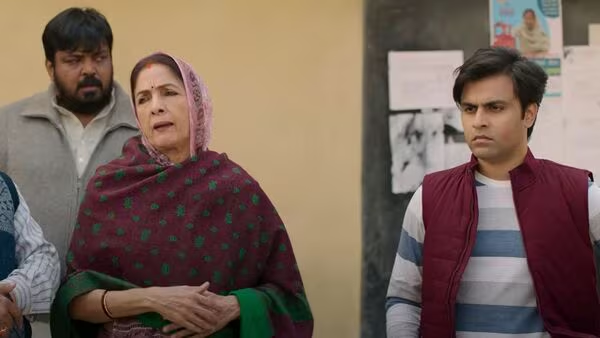Panchayat Season 4 premiered on Amazon Prime Video today. While some viewers praised its heartwarming elements, others found it chaotic and felt it lost the simplicity of earlier seasons.

Panchayat Season 4 Review
The quaint village of Phulera is back in the spotlight with the release of Panchayat Season 4 on Amazon Prime Video on June 24, 2025. This beloved Indian comedy-drama, known for its heartwarming portrayal of rural life, has returned with a new chapter that dives headfirst into the high-stakes drama of village elections. Created by The Viral Fever (TVF), written by Chandan Kumar, and directed by Deepak Kumar Mishra and Akshat Vijaywargiya, the season picks up where its predecessor left off, but its shift toward political intrigue has sparked a polarized response. Fans and critics alike are torn: Is Panchayat Season 4 a bold evolution or a departure from the show’s signature charm? This blog explores the season’s narrative, performances, and the political and cultural implications of its new direction, weaving in the story of its creators and the broader context of Indian storytelling.
A New Chapter in Phulera: Elections Take Center Stage
Panchayat Season 4 thrusts viewers into the heart of a heated panchayat election, pitting incumbent Pradhan Manju Devi (Neena Gupta) against her formidable rival, Kranti Devi (Sunita Rajwar). The season resolves the cliffhanger from Season 3, revealing the truth behind the shooting of Pradhan Ji (Raghubir Yadav), Manju Devi’s husband and the village’s de facto leader. The election becomes a battleground, with both camps deploying catchy slogans, public stunts, and subtle scheming to sway Phulera’s voters. Abhishek Tripathi (Jitendra Kumar), the urban-educated panchayat secretary, finds himself entangled in the political fray while grappling with a police case under IPC Section 323 for slapping Bhushan (Durgesh Kumar). This legal trouble strains his budding romance with Rinki (Sanvikaa), adding emotional weight to his journey.
The season’s focus on electoral politics marks a departure from the lighter, slice-of-life narratives of earlier seasons. Where previous episodes reveled in the quirks of village life—power cuts, petty disputes, and heartfelt community moments—Season 4 leans into the chaos of grassroots democracy. Abhishek’s struggle to maintain neutrality as the village secretary, coupled with the manipulative tactics of Bhushan’s camp and the involvement of the local MLA, Chandra Kishore Singh (Pankaj Jha), creates a denser, more serious tone. Yet, familiar elements persist: the secret meetings at the water tank, the camaraderie among villagers like Prahlad (Faisal Malik) and Vikas (Chandan Roy), and the understated humor that defines Phulera.
Fan Reactions: A Love-Hate Affair with Politics
The shift to a politics-heavy plot has divided Panchayat’s loyal fanbase. Social media platforms, particularly X, buzzed with reactions within hours of the season’s midnight premiere. Some viewers embraced the narrative evolution, praising its realistic portrayal of rural elections. One fan on X rated the season 3.5/5, noting, “This time Fulera feels more political than comedy, but you will still get a good time. The best thing is that the makers are not scared to go forward in the storyline.” Others, however, mourned the loss of the show’s lighthearted charm, with one user lamenting, “The election drama feels overstuffed, with too much chaos and unnecessary complexity. It lost the simplicity we loved.” Another viewer remarked, “Compared to previous seasons, it’s weak… the comedy level doesn’t match iconic moments like the chappal episode.”
Despite the criticism, fans lauded the performances, particularly Neena Gupta’s commanding portrayal of Manju Devi and Faisal Malik’s emotionally resonant Prahlad. Jitendra Kumar’s Abhishek, however, drew mixed reviews, with some feeling his character arc lacked depth. A post on X expressed hope for the future, stating, “Binged #PanchayatSeason4… subtle, Desi, yet entertainment overdose. Can’t wait for season 5 already.” The consensus among fans seems to be that while Season 4 is binge-worthy, its political focus overshadows the humor and warmth that made Panchayat a cultural phenomenon. Many are optimistic that Season 5 will restore the balance between drama and levity.
Critical Perspectives: A Mixed Bag of Praise and Critique
Critics have echoed the divided fan sentiment, offering nuanced takes on Panchayat Season 4. India Today delivered a harsh verdict, awarding the season 2.5/5 stars and calling it a “disappointing return” that lacks the emotional depth and simplicity of its predecessors. The review criticized Abhishek’s restrained character arc, arguing that his role as the neutral secretary felt underwhelming. In contrast, Moneycontrol gave the season a solid 3.5/5, praising its “subtle emotions and quiet moments” that capture the beauty of mundane life. The review acknowledged the politics-heavy plot but appreciated its realistic depiction of rural power dynamics.
Sreeparna Sengupta of The Times of India offered a more positive take, rating the season 4/5 for its “well-timed dialogues and situations that keep you chuckling.” Scroll.in’s Nandini Ramanath noted that the series excels in exploring the “foibles of its handful of characters,” describing it as a “comedy of mofussil manners.” Despite the mixed reviews, critics agree that the show’s strength lies in its authentic portrayal of rural India, with its ensemble cast delivering standout performances. The election narrative, while divisive, reflects the makers’ willingness to experiment, ensuring Panchayat remains a distinctive voice in Indian storytelling.
The Creators and Cast: Crafting a Cultural Touchstone
Panchayat’s success stems from the vision of The Viral Fever (TVF), a production house known for grounded narratives like Kota Factory and Permanent Roommates. Creator Deepak Kumar Mishra, who co-directs with Akshat Vijaywargiya, drew inspiration from classic Doordarshan shows like Malgudi Days, aiming to capture the essence of rural life. Writer Chandan Kumar’s scripts weave humor, emotion, and social commentary, rooted in extensive research across Indian villages. The decision to shoot in a real panchayat office in Mahodiya, Madhya Pradesh, adds authenticity, with cinematographer AmitabAPPER Singh capturing the rustic beauty of the setting.
The cast, a blend of seasoned actors and fresh talent, brings Phulera to life. Jitendra Kumar, a former IIT Kharagpur student turned actor, embodies Abhishek’s urban-rural divide, while Neena Gupta, a veteran of Indian cinema, delivers a layered performance as Manju Devi, evolving from a reluctant leader to a confident contender. Raghubir Yadav, with his extensive theater and film background, grounds Pradhan Ji with warmth and gravitas. Faisal Malik’s Prahlad, a grieving father turned village stalwart, resonates deeply, while Sanvikaa’s Rinki adds a tender romantic subplot. The ensemble, including Chandan Roy, Durgesh Kumar, and Sunita Rajwar, creates a vibrant tapestry of characters that mirrors rural India’s complexity.
Political and Cultural Implications: Reflecting Rural Realities
Panchayat Season 4’s focus on elections taps into the pulse of grassroots democracy, a cornerstone of Indian governance. The rivalry between Manju Devi and Kranti Devi reflects real-world dynamics of power, gender, and community loyalty in rural politics. The show’s satirical take—complete with exaggerated campaign promises like “airbag-fitted cycles” and “runways for autos”—mirrors the theatrics of Indian elections while highlighting their impact on village unity. Abhishek’s legal troubles under IPC Section 323 (voluntarily causing hurt) underscore the personal toll of political entanglements, a relatable theme for those navigating bureaucratic systems.
The season’s shift toward drama also reflects broader trends in Indian OTT content, where platforms like Amazon Prime Video balance global appeal with local storytelling. Panchayat’s success, with an IMDb rating of 9.0 and multiple Filmfare OTT Awards, has made it a cultural touchstone, inspiring Tamil and Telugu remakes. Its exploration of social issues—gender roles, class divides, and rural aspirations—resonates across urban and rural audiences, bridging India’s cultural divide. However, the politics-heavy plot risks alienating viewers seeking the “sukoon” (peace) of earlier seasons, raising questions about the show’s long-term identity.
The Viral Fever’s Legacy: Redefining Indian Entertainment
Founded in 2010, TVF has revolutionized Indian digital content, moving from YouTube sketches to critically acclaimed series. Panchayat, launched in 2020, marked TVF’s first major collaboration with Amazon Prime Video, followed by successes like Hostel Daze. The company’s focus on authentic, relatable narratives has disrupted Bollywood’s urban-centric storytelling, with Panchayat’s rural setting earning praise for its realism. TVF’s Arunabh Kumar and Deepak Kumar Mishra have hinted at a “village cinematic universe,” akin to Marvel’s interconnected franchises, suggesting future spin-offs like Gram Chikitsalay. This ambition underscores TVF’s role in shaping India’s OTT landscape.
The early release of Season 4, moved from July 2 to June 24 after a fan-driven online poll, highlights TVF’s innovative engagement with audiences. Over 6.5 million votes in the “Manju Devi vs. Kranti Devi” campaign turned the election theme into a real-time marketing triumph, reflecting the show’s cultural impact. Neena Gupta, speaking about her role, noted, “Portraying Manju Devi has been deeply fulfilling… her journey from a hesitant pradhan to a confident voice is exciting.” Jitendra Kumar echoed this, calling Panchayat a “cultural phenomenon” that resonates across demographics.
Looking Ahead: Can Season 5 Recapture the Magic?
Panchayat Season 4 is a bold experiment, trading some of its lighthearted charm for a deeper dive into political drama. While it retains its binge-worthy appeal, the season’s mixed reception suggests a need for recalibration. Fans and critics hope Season 5 will blend the election saga’s intensity with the simplicity that defined Panchayat’s early success. The unresolved arcs—Abhishek and Rinki’s romance, Prahlad’s emotional journey, and the fallout of the election—set the stage for a potentially explosive continuation.
The season’s political focus also mirrors global trends, where narratives of power and community resonate amid rising populism. In India, where rural voters shape national elections, Panchayat’s portrayal of grassroots politics feels timely, though its execution has sparked debate. As Phulera navigates its future, so too does Panchayat, balancing its roots with ambitions to evolve. For now, the show remains a testament to the power of authentic storytelling, even if its latest chapter divides its audience.
Disclaimer: This blog is based on publicly available reviews and reports, crafted for clarity and professionalism. It reflects sentiments as of June 24, 2025, and may not account for subsequent developments.
Source: Compiled from reviews and social media posts on Panchayat Season 4, including India Today, Moneycontrol, The Times of India


